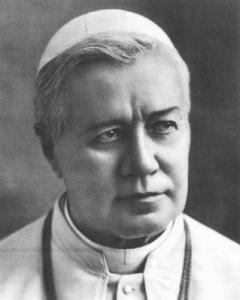Rosary and Salvation
Those who have read me for some times know that whilst my attitude toward salvation is probably – in line with my Mediterranean upbringing – more relaxed than the apocalyptic concept of some, particularly Northern European, hard-liners, I still do not indulge in complacency as far as salvation is concerned.
I obviously do not subscribe to any of the childish heresies of Medjugorje (not recognised by the Church as worthy of belief), but I am not a fan of the devotion of the Divine Mercy (recognised as worthy of belief) either. I love to think that the faciloneria of so much post V-II thinking (= the departed was such a fun chap, therefore God certainly called him to Himself to enjoy the jokes and it is well-known that in Hell Stalin, Hitler and Pol-Pot need Satan if they want to play a hand of poker) has not polluted me.
Still, in order to avoid you thinking me too harsh or tinged with unforgiving puritanism I’d like to spend some words about something that might be of interest for some reader: what I personally see the proper understanding of the Rosary in the economy of salvation in the light of the Marian promises. In doing so, I will remain (as far as I know) within the path of the strictest traditional (that is: pre-VII) understanding of them.
It is well-known that the Blessed Virgin appeared to St Dominic and Blessed Alan de la Roche giving (or confirming) the famous fifteen promises to those who faithfully and devoutly pray the rosary. It is not my intent to examine in detail the circumstances of such revelations, as the fact that they have been traditionally considered perfectly in line with Catholic teaching is sufficient to me. What is important to note here is that the Blessed Virgin clearly wanted to point out to the great advantages that faithful, devout, daily (as we know beyond doubt from the Fatima apparition) recitation of the Rosary carry with them.
I will here examine only those among the promises which I consider most strictly linked to the only real aim we have in life: salvation. I invite the reader to – if they feel so inclined – give their alternative interpretation and explain why they would give a more restrictive (or more lenient) interpretation than the one I give.
a) Promise #5:
The soul which recommends itself to me by the recitation of the Rosary shall not perish.
This is very strong, and the presence of such a limited number of words in the phrase doesn’t leave much space for alternative interpretations: if you recommend yourself to the Blessed Virgin by your daily effort, you are going to make it. This clearly requires that the rosary is prayed well. This also requires a contrition and consciousness of one’s own sinfulness implicit in the perceived necessity of recommending one’s soul to the Blessed Virgin. Therefore, the promise doesn’t apply to people like:
1) those who pray a distracted, shallow, rushed Rosary, whose main aim is to “get done with it”.
2) those who are not faithful in their recitation (“oh well, I pray the rosary in principle every day, but in the last months I had (fill here excuse) to do and therefore it was perhaps three times a month” would, methinks, not qualify).
3) those who do not see that they are in need of any recommendation because they are so “inclusive”, “modern” and otherwise “tolerant” and “non violent”.
Still, promise #5 is a very powerful promise and I am very glad that it was given, and in such powerful terms.
b) Promise #6:
Whosoever shall recite the Rosary devoutly, applying himself to the consideration of its Sacred Mysteries shall never be conquered by misfortune. God will not chastise him in His justice, he shall not perish by an unprovided death; if he be just he shall remain in the grace of God, and become worthy of Eternal Life.
This I interpret in the sense that those who pray the Rosary well (you will notice the insistence on this point) will: 1) not be driven to despair and in the end to the ultimate blasphemy, suicide, by the difficulties and crosses of life, 2) nor will they, as the saying once went, be surprised by death by being caught by the Reaper in the state of mortal sin.
This obviously doesn’t mean that the one who prays the rosary will not sin mortally – as the “if” of the last sentence makes abundantly clear – . This merely means that the sincere intention to obtain a happy death will, in this case, be helped by the Blessed Virgin with such a powerful intercession, that she will obtain for the faithful who perseveres in devoutly praying the Rosary the grace of a happy death.
c) promise #7:
Whoever shall have a true devotion for the Rosary shall not die without the Sacraments of the Church.
This echoes what has been said before. “Sacraments” here doesn’t mean “Last Rites”, and therefore the meaning is not that, a contrario, if one is knocked by a bus and dies instantly he hasn’t been praying the rosary faithfully. Confession and communion are, I think, rather meant here.
d) Promise #8:
Those who are faithful to recite the Rosary […….] at the moment of death […] shall participate in the Merits of the Saints in Paradise.
Note once again: 1) the Rosary must be recited faithfully, and 2) the promise only applies to the moment of death.
e) Promise #15:
Devotion to my Rosary is a great sign of predestination.
This is a bit complicated.
“Predestination” means, for a Catholic, that whilst every human being is perfectly free to make his own choices, God already knows what choices each and everyone of us will make. This, mind, does not limit our freedom more than the freedom of the football players is limited just because I happen to know, after the fact, how their match ended.
Therefore, God already knows whether each one of us is going to achieve salvation or not; but this doesn’t make us any less free in every decision we make. This promise is therefore there to give the faithful great comfort in the fact that his devotion makes it pretty likely (but not certain!) that he will, in fact, persevere in his faith, obtain a happy death and be among those whose salvation had been foreseen by God from all eternity.
These are the promises. Let us now try to put them into a practical, everyday context.
1) A person prays the rosary without devotion, just as a habit.
The promise of Mary doesn’t apply to him, because the point of praying devotedly, faithfully etc. is stressed on several occasions. Let’s not try to cheat here, as we’ll not get away with it.
2) A person prays the rosary every day, but is manifestly evil or a great sinner.
This is not in contradiction with the promises as they do not refer to saintliness in life, but to salvation at the end of it. Whilst the Rosary will be a great help (if recited properly) to one’s spiritual improvement, the recitation of the rosary is no automatic means to saintly behaviour in life.
Such a person will, therefore: a) stop praying the rosary, or b) stop praying it devoutly, thus losing the protection afforded by the heavenly promises, or c) insist in his devout recitation and in the end – and I am sorry here for you, puritan supporter of the fire and brimstone faction 😉 – still manage to get a happy death by the special intercession of Mary.
Notice here that the Blessed virgin doesn’t even promise that those who devoutly pray the rosary will refrain from evil doings. The rosary works slowly, imperceptibly as Pius XII says in his encyclical letter on the matter. It doesn’t create an immediate either/or situation; on the contrary, the either/or only applies at death.
Please also notice that this doesn’t mean that a person can plan on praying the rosary, so to speak, as one pays an insurance premium and think that he can, after paying his dues, willfully go on living an evil life with the certainty of final salvation. It is obvious that such an evil intention is not compatible with the devout and faithful recitation of the rosary.
3) A person prays the rosary every day as devoutly as he can, but he is assailed by recurring doubts as the whether he will be saved, and the fact that God already knows whether he will be saved or not is, to him, not in the least reassuring.
This person can greatly benefit by the recitation of the rosary because he will know that he can have a tangible sign of his working toward his salvation one day at a time. In other words, he knows a) that as long as he perseveres there is no cause for scruples, and b) that he only has to persevere to avoid the scruples assailing him. If you suffer from scrupulosity, I doubt that there is a better cure around than your daily medicine, the Rosary.
In my eyes, this is pretty much the interpretation of the effect of praying the rosary that would have been given to a quisque de populo in – as the Italians love to say – tempi non sospetti. It seems to me that it adheres strictly to the tenor of the promises without indulging in dangerous complacency, but without losing sight of the wonderful weapon that has been put in our hands.
I can’t stress enough (and will regularly insist on this point as long as I blog) how important the Rosary is in the life of the Catholic. So much so, that it seems to me that the faithful who willingly decides not to take the habit of the daily recitation of the rosary is like the stuntman offered helmet and body protection and refusing them on the ground that he believes himself to be professional enough to escape harm.
Mundabor
Posted on May 5, 2011, in Catholicism and tagged Blessed Alan de la Roche, Blessed Virgin, Catholic, Catholicism, Christianity, Conservative Catholic, conservative catholicism, Divine Mercy, God, Mary (mother of Jesus), Religion and Spirituality, Rosary, St. Dominic. Bookmark the permalink. 4 Comments.





















Praying the Rosary with total attention is one of the hardest things I know.
I agree.
But I do not think that “total attention” is necessary, rather a devout and faithful attitude.
At the beginning, I needed one hour or more to pray the five decades. I insisted on being fully focused on every single word. The local priest told me that it was better to relax a bit to be sure I don’t stop reciting it. In the end, if you participate to a rosary in the church you can’t stop everyone every time you have lost concentration….. 😉
M
A series of fine posts. You’re right on the money again with the idea of the Rosary as much a way of living as of praying. It’s almost an attitude as much as an act. I caught up with 4 or 5 of yours posts today, having stayed away from the computer for other reasons. You’re doing a fine job. I wish you all success.
Thanks 308s,
it is always a pleasure to know that one is not working in vain.. 😉
M